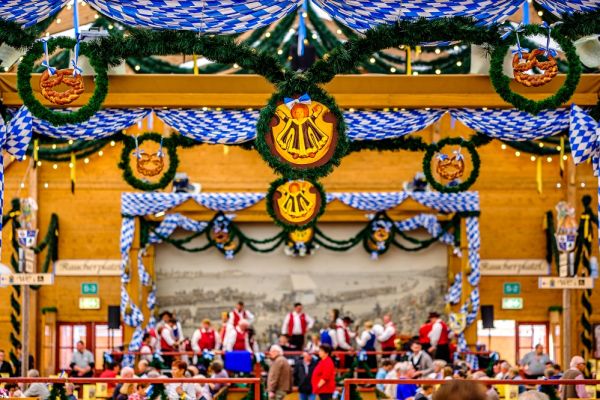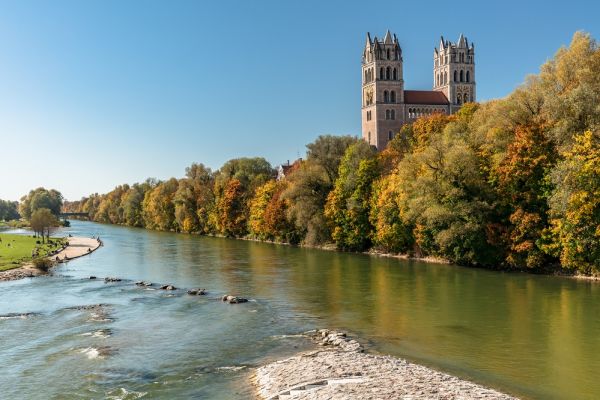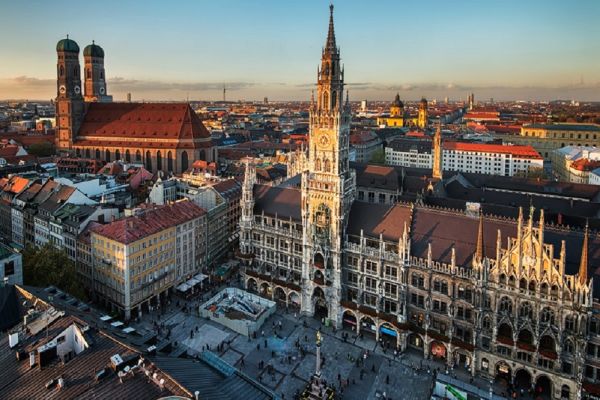MunichTravel Guide
Germany’s third largest city has a personality all its own. Wander up to St Peter’s Church on the hill between Rindermarkt and Marienplatz and you’ll be treated to a magnificent view of the city. Where to first? Munich has many delights to explore, from the elaborate Glockenspiel cuckoo clock in the city’s town hall to the slick BMW showroom and the beautiful Englischer Garten. Best of all, Munich’s obsession with beer means that the city is full of places to enjoy a relaxing cold brew, from city terraces to lakeside beer gardens sheltered by ancient trees.If you’re planning a visit, explore our Munich travel guide and find out how to make the most of your time in Bavaria’s capital. We’ve collected the best tips from our travel experts, and have all sorts of suggestions for things to do, the best time to travel, where to stay in Munich, getting around and more.
Munich quick facts
Language
National language
German
Beverages
Bottle of Coke/Pepsi (330ml)
GBP £3.05
Local time
Wednesday
12:25pm
Currency
Euro
GBP £1.00 = EUR €1.17
Eating out
Restaurant meal (casual dining)
GBP £14.52
Electricity
Plug type: C
2 pins • 230V
Explore Munich
Where to stay in Munich?
Deciding where to stay in Munich can help you ensure you see all the sites the city has to offer. Whether you want to tour amazing palaces, take in museums and cultural experiences or find some of the best restaurants in the city, there’s no shortage of things to do. The public transport system here means finding either affordable hotels or luxury places to stay in Munich is easy – you’ll never be a long journey from any of the attractions you’d like to visit.
Hauptbahnhof, or Munich Central Station, is the spot to book if you want affordable and convenient accommodation. While you might recognise some of the international budget hotel chains here, there are also a couple of independent hotels that offer fantastic value for money. A stay in this spot puts many attractions within convenient walking distance.
One of the most popular regions to stay in Munich is Ludwigsvorstadt-Isarvorstadt, with plenty of choice in accommodation. Enjoy some of the cultural experiences of Isarvorstadt, including Gartnerplatz theatre or the Marionette theatre. If you plan to stay here during December, the Christmas market draws many tourists – so book early!
While mostly residential areas, both Laim and Sendling offer some comfortable accommodation if you wish to get away from the tourist areas. Close to reliable public transport, staying in either of these districts is affordable; plus you'll be within a short distance to Marienplatz markets, Nymphenburg Palace and Englischer Garten.\
If you're looking for luxury, Schwabing and Maxvorstadt will be your best bet. International hotel chains, such as the Marriott and Mercure, can both be found in Schwabing, while 5-star Munich hotels in Maxvorstadt ensure you'll have a very comfortable stay.
Along with Ludwigsvorstadt-Isarvorstadt, Altstadt-Lehel is a popular spot for Munich accommodation. Here you'll find a range of apartment-style accommodation to suit all budgets, as well as luxury, 4-star and 3-star hotels. Public transport is readily available in the area, ensuring easy access to many attractions within Munich. Whether you want a touch of luxury or a cheap and cheerful place to stay, Altstadt-Lehel is a great base.
Believe us when we say, this is just the start. Book your Munich accommodation today!
Things to do in Munich
With so many things to do in Munich, it’s a good idea to take the time to plan your itinerary. Attractions include historical sights, cathedrals, castles and concert halls, as well as breathtaking natural scenery. The shopping in Munich covers every style, from designer labels to vintage treasures and markets. Rich in art and culture, Munich is a wonderful city to explore at any time of the year.
The summer residence of the Bavarian monarchs, Schloss Nymphenburg, or the Nymphenburg Palace, is one of the largest royal palaces in Europe. Within the palace grounds you'll find the Museum of Man and Nature (Museum Mensch und Natur), the Porcelain Museum, and 299ha of garden. Take a stroll through the grounds and see sculptures, streams, and landscaped gardens.
The Neo-Gothic New Town Hall (Neues Rathaus) offers amazing views across the city. The 85m-high tower houses an observation deck, from which you can see as far as the Alps. The world-famous Glockenspiel Munich, part of Town Hall, springs to life several times per day with figurines from history representing stories of Munich.
One of the most-visited castles in Europe, with some days attracting 10,000 visitors, Neuschwanstein Castle is a breathtaking sight. Built on the edge of a cliff, the castle of King Ludwig II is like something out of a fairytale. Marvel at the beautiful architecture, the spectacular location, and the luxurious furnishings. Just over an hour and a half's drive from Munich, it's well worth a day trip.
The largest museum of technology in the world, the Deutsches Museum in Munich is a must-see for lovers of technology and development. Filled with rare German aircraft, scientific demonstrations and almost every type of transport you can imagine, this museum is equally impressive and interesting. Take a guided tour or wander each department for yourself.
Constructed in 1836, Alte Pinakothek is designed with a castle appearance in mind. Home to a collection of paintings spanning the 14th through to the 18th Century, it's one of the oldest art galleries in the world. Here you can see works by artists such as Rembrandt, da Vinci, Raphael, and Albrecht Altdorfer.
Treat yourself to a tour fit for a king at Schleissheim Palace. The courtyard gardens have had many design features preserved, with stunning water features nestled among colourful garden beds. As if the castle itself is not beautiful enough, you can also browse works from the Bavarian State Painting Collections, which are housed within the castle.
The Frauenkirche is Munich's largest church, with room for up to 20,000 people, and is the city's most famous landmark. Built in a distinct baroque style, the cathedral is beautifully positioned within Munich's Old Town, and its impressive domed towers can be seen far and wide from across the city. It's a popular tourist attraction that is well worth visiting.
The beautiful grounds of Linderhof Palace can be found in the foothills of the Bavarian Alps. It was the only castle built by King Ludwig II of Bavaria that was finished when he was still alive – and his favourite. The oval dining room and entrance hall are stunning, regal in design and furnishings. The grounds are filled with eclectic buildings, a 30 metre tall fountain, and gorgeous grotto.
The largest museum in Munich, Residenzmuseum is found in the main palace of Bavarian rulers. Impressive and beautifully styled, a highlight of the museum is the Antiquarium, which is filled with statues and artworks featuring some of the most beautiful castles of Bavaria. Visitors to the Residenz can see stylings of Renaissance, Baroque, Neo-Classicist, and Rococo.
With permanent exhibitions dating back 90 years of history, the BMW Museum in Munich will have any car lover hooked. Explore seven different exhibition sections, from roadsters to art cars, or head over to the ‘Museum Bowl'. This wing of the museum houses temporary exhibitions, ensuring there's always something new to take in.
Munchner Stadtmuseum, or Munich City Museum, is home to many collections of historical value. Here you can learn everything you need to know about Munich's history, through almost every medium you can imagine. Permanent exhibitions include sculpture, portraits, furnishings, photographs and musical instruments, as well as examples of traditional marionette theatre.
Looking for an immersive experience? Then a Munich tour is the way to go.
Munich travel tips
Travelling to any international destination requires a little forward planning, but these Munich travel tips will help you prepare for your stay. Munich is very clean and easy to navigate, from the historical landmarks to the beautiful parklands. Pack your passport and your euros and get ready to experience an amazing city. As one of Germany’s biggest cities, Munich’s official language is, of course, German. However, many people also speak English, which makes it easy to navigate the city and experience all it has to offer. The Munich travel advice included below will help you prepare for (and enjoy!) your trip.
Australian citizens travelling to Munich for less than 90 days are not required to apply for a German visa, as Germany forms part of the Schengen zone. Australians can travel within the Schengen zone for tourist purposes for up to 90 days without a visa. Speak to your local Flight Centre Travel Expert if you have any questions relating to your visa requirements.
Food in Munich varies from traditional German fare to international cuisine. Dining varies from cafe culture to casual restaurants, food trucks to high-end dining. Be sure to try some of the delicious baked goods and traditional Bavarian treats such as franzbrotchen. There are also many delis dotted around the city, offering rich cheeses and delicious smallgoods.
The plugs and voltage used in Munich are different to those in Australia. Electrical current used in Germany is the same as most European countries: alternating current, 220V. The outlets require wall plugs with two round pins, so a universal adapter may be required to use your electrical appliances.
The main airport serving Munich is Franz Josef Strauss Airport, which is located approximately 40km from the city centre. Direct flights from most European capitals, as well as many international destinations, arrive at Munich Airport each day. Transport to and from the airport is available by private transfer, S-Bahn (train), bus, and taxi.
The currency in Germany is the euro (€), which is the official currency of the European Union. The denominations of the euro are similar to the breakdown of the Australian dollar, divided into one hundred cents. Banknotes begin at €5, while coins come in 1, 2, 5, 10, 20 and 50 cent denominations, as well as 1 and 2 euro coins.
Wondering whether you're supposed to leave a tip? Like most parts of Germany, tipping is included in the service price for restaurants and bars. Still, rounding the figure up to the nearest euro is common. If you wish to tip a tour guide, common practice is to tip 10% of the tour cost.
While German is the main language of Munich, many locals also speak English, particularly in popular tourist destinations. You'll also find that many German words are also quite recognisable in English, which can make it easier to find your way around the city.
Munich food and drink
Aside from the beauty of the city, Munich food and drink is one of the most exciting things to explore. Try traditional Bavarian dishes such as weisswurst (veal and pork sausage) and schweinsbraten (roast pork), or step into some of the most extravagant beer halls in the city. Enjoy a schmalznudel, a type of Bavarian pastry, in a cosy Munich cafe or taste leberkase, a loaf of sausage with mustard and soft bread. From the restaurants of Old Town to the riverside cafes of Glockenbachviertel, you’ll have no trouble satisfying your hunger (or your sweet tooth!) during your time in Munich.
Begin your search for the best meal in Munich's Old Town (the altstadt), where plenty of traditional dining is on offer. Hofbrauhaus, the oldest beer hall in the world, is a top pick. For casual restaurant dining, explore Schwabing – while Munich may have been considered conservative in the past, you'll find a variety of cuisine here, including Thai, Vietnamese, Indian and Ethiopian restaurants
Whether you need to refuel after a morning exploring museums, or you want to start your day with a coffee and breakfast, Munich cafes won't disappoint. You'll find plenty of options in Glockenbachviertel along the river, and also in Viktualienmarkt or nearby Elisabethmarkt. Coffee in Munich is best enjoyed with a franzbroetchen (a type of cinnamon pastry).
The traditional beer culture is just one reason to check out Munich bars and nightlife. A visit to one of the city's beer gardens is a must, particularly to sample steckerlfisch (grilled fish). Trendy cafe bars in the Glockenbach region are perfect for a nightcap, while a glass of wine in the artsy Theresienwiese area is a great way to finish a day of exploring.
Viktualienmarkt, found in the city centre, is one of the most famous food markets in Munich. Charcuterie, venison burgers and breads are best washed down with a Radler (a refreshing beer and lemonade blend). Christmas markets provide a fantastic opportunity to try some of Germany's best fare, including mulled wine, currywurst and caramelised almonds.
Get a real taste for the local cuisine by booking a Munich tour.
Munich through your eyes
Where to shop in Munich?
Munich shopping varies from high-end shopping districts to open-air markets stocking giftwares, souvenirs and second-hand goods. You’ll find designer brands like Prada and Tiffany on Residenzstrasse, or shop in the many gorgeous boutiques of Maximilianstrasse. Browse Stachus Passagen, Europe’s largest underground shopping centre, or head to Schwabing for jewellery you’ll be able to treasure for years to come. Whatever you’re shopping for, you’ll find the right places to browse and buy.
Visiting one of the Munich markets is a fantastic way to experience a little bit of everything. Viktualienmarkt, once a casual farmers' market, has now become one of the most popular markets for food, including fresh vegetables and fruit, small goods, and wine. Munich Christmas markets, in Marienplatz, are a beautiful tradition that simply must be experienced if you're travelling in Germany during December.
If a little holiday shopping is what your heart desires, Munich shopping centres will happily oblige. Visit Stachus Passagen for clothes, gifts, delicious foodie treats, and more. The Hofstatt, in the heart of Munich, is filled with fashion retailers, as well as many cafes and restaurants to satisfy any palate.
There are a number of shopping districts in Munich to try, whether you're searching for boutiques or you're keen to see what Munich fashion has to offer. The city centre, Maximilianstrasse and Glockenbachviertel are hotspots to unearth fashion from new designers. Meanwhile, the bohemian district of Schwabing will delight with boutiques, jewellery stores, and vintage shops.
When is the best time to travel to Munich?
A continental climate means that Munich weather features hot summers and cold winters. If you plan to visit during Oktoberfest, remember to bring some warm clothes. Low season in Munich (outside of the Christmas and holiday season) means less crowds, but the cold weather will have set in. The best time to travel to Munich very much depends on your plans during your visit – whether you want to explore Christmas markets, enjoy the beautiful parklands, or enjoy a cold beer in a traditional beer garden.
Summer in Munich is the high season for tourism, with many festivals dominating the city's calendar. Temperatures average between 20°C and 23°C during the day, so it's perfect for spending the day outside, relaxing in one of the city's parks or enjoying a drink in the beer gardens. Rainfall in Munich is at its highest during June. Appropriate clothing: Shorts or a skirt and a t-shirt Don't forget: A raincoat
The winter in Munich is cold, with some winds and snow common. Temperatures range from an average of 3-4°C during the day, and an average nightly temperature around -3°C. Winter has the least rain, and February is the month that usually has the lowest rainfall of any time of year. Appropriate clothing: A winter jacket, warm hat and scarf Don't forget: Buildings are very well heated, so layers are important
Autumn is one of the best times to travel to Munich, although it's also one of the busiest. The days tend to be sunny throughout October (ideal for Oktoberfest visits) while November tends to bring much colder weather. Autumn often brings the wind, with temperatures averaging between 0°C and 20°C. Appropriate clothing: Long pants and a jumper Don't forget: A raincoat or umbrella
Spring presents the perfect time to enjoy a coffee in one of the alfresco cafes next to the river, or to enjoy a traditional German beer in a beer garden. The weather tends to bring warmer days and cool nights, with temperatures ranging from -2°C overnight to 18°C during the day. Fohn, a warm and dry wind that descends from the Alps, is also common during spring. Appropriate clothing: Jeans and a t-shirt, with a jacket for the evenings Don't forget: Comfortable shoes to walk around in
Don't miss out. Book your Munich flight today!
How to get around Munich
As you would expect in a city of its size, Munich transport options are plentiful. Getting around is affordable, should you choose to walk, hire a bike, or make use of public transport. As it’s a clean and compact city, you can take the time to wander and explore Munich on foot. Like many European cities, bikeways are common, so bike hire is another fantastic way to explore. Hop aboard the S-Bahn or take a bus to some of the city’s most iconic sights, from museums to castles and the beautiful Bavarian surrounds.
Hop into one of the many Munich taxis for quick and convenient transport to your hotel, the airport, or any other destination. Taxis may be hailed, or you may prefer to use one of the many taxi ranks around the city. Fares are charged on a rate per kilometre, with a basic hire fare also included.
With pathways throughout the city, Munich bike hire is a convenient and fun way to explore the city at your own pace. In addition to more than 800km of pathways throughout the city, many parks have cycleways as well. A number of bike hire companies in Munich offer bikes to suit every rider.
Like most in Germany, the Munich public transport system is one of the easiest and quickest ways to get around. Public transport includes buses, trams and the S-Bahn and U-Bahn rail systems. There are several different travel zones, so a day pass is good value if you plan to take multiple trips during the day.
If you plan on walking Munich, the central district includes many sites you can take in comfortably in a day. There are many pedestrian zones and the city is wonderfully clean, so exploring Munich on foot is certainly a great way to see things at your own pace. Just be mindful that you will often cross cycling paths, so keep an eye out for bikes as you walk.
Let us help you organise your own wheels for exploring. Hire a car in Munich today!
SIGN UP to WIN a holiday to New Zealand worth £7000*!
Sign up for our hottest deals, travel inspo & more!
What are the best parks in Munich?
When it’s time to escape the hustle and bustle, head off to explore Munich’s parks and squares dotted around the city. From the English Garden (Englischer Garten), a 360ha park filled with greenery, ponds, a wave pool and laidback beer gardens, to the Hofgarten, a beautiful park behind one of the busiest squares in Munich, you have plenty of opportunity to explore the city’s tranquil side. Be sure to pay a visit to the Angel of Peace, and take a moment to try and snap the perfect picture just as the sun goes down.
The English Garden (Englischer Garten) is the green heart of Munich. Stretching alongside the Isar River, the park takes its name from the English gardens it was inspired by. The park has more than 78km of pathways, green spaces for sport or soaking up the sunshine, and a huge beer garden where you can relax and enjoy some of the world's best beers. If you head to Eisbachwelle, you'll find year-round surfing in the Eisbach River, too!
Located behind the Odeonsplatz, Hofgarten is a beautiful Munich park filled with colourful gardens, fountains and a beautiful pavilion. Come to hear orchestral music, or find a sunny spot to relax. As the Hofgarten lies next to Munich Residenz, the park is a lovely spot to add to your tour, giving you a glimpse of the exquisite grounds.
Home to events throughout the year, Konigsplatz is where modern and classic meet. Catch a concert series, admire ancient Greek and Roman artworks, or sip a cold drink in the beer garden. During the summer, an open-air cinema features both new and old movies, bringing viewers from all over the city. Throughout the day, you can enjoy the sunshine in the garden or sit on the staircases of Konigsplatz.
One of the most recognisable squares in Munich, Odeonsplatz is named after the former concert hall, Odeon, which was destroyed in World War I. Take in the beauty of the square from the steps of Feldherrnhalle, positioned directly between two of Munich's historical treasures: the Theatinerkirche and Residenz. Admire the Neo-Classical buildings and the significance of the square itself.
It would be difficult to visit Munich and not appreciate the magnificent Angel of Peace (or Friedensengel). Atop a 23m column, the golden statue is a monument marking 25 years of peace following the end of the Franco-Prussian War. Holding an olive branch in one hand, the Angel is flanked by a fountain, which is spectacular when illuminated in the evening.
Getting from park to park is so much better with your own wheels. Hitch your ride now!










